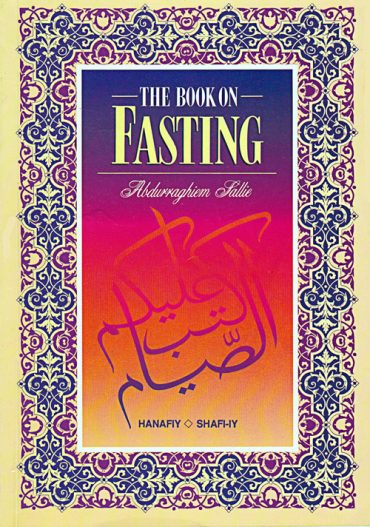Showing the single result

Fasting is one of the most meritorious acts in Islam. In this book the fiqh (jurisprudence) of fasting, as well as its excellence, virtues and benefits, are expounded upon, which will if read and understood, enhance the observance of fasting to a higher degree, Insha-Allah.
The definitions of fasting, the various types of fasting and its principles and rules are defined. The sighting of the crescent, the manner in which the months of Ramadan and Shawwal becomes official, the viewpoint of the astronomer and the Hakim (judge) are discussed.
Other interesting discussions include fasting on Youmush Shak (the day of doubt), the various viewpoints of Laylatul Qadr, the fifteenth night of Sha’ban (Laylatul Bara-’ah – the night of pardoning of sons), and the days when fasting becomes haram (unlawful), makruh (abominable) and sunnah (recommended).
Fasting is one of the most meritorious acts in Islam. In this book the fiqh (jurisprudence) of fasting, as well as its excellence, virtues and benefits, are expounded upon, which will if read and understood, enhance the observance of fasting to a higher degree, Insha-Allah.
The definitions of fasting, the various types of fasting and its principles and rules are defined. The sighting of the crescent, the manner in which the months of Ramadan and Shawwal becomes official, the viewpoint of the astronomer and the Hakim (judge) are discussed.
Other interesting discussions include fasting on Youmush Shak (the day of doubt), the various viewpoints of Laylatul Qadr, the fifteenth night of Sha’ban (Laylatul Bara-’ah – the night of pardoning of sons), and the days when fasting becomes haram (unlawful), makruh (abominable) and sunnah (recommended).
Fasting during the early days of Islam, actions which nullify the fast such as eating and sexual intercourse as well as the kafarah (atonement) for the transgression are explored. Reasons which make eating permissible during Ramadan and its judgement are discussed with a valuable addition to the book on pregnancy and breast-feeding. A medical perspective on fasting which answers popular questions on fasting has also been added. I’tikaf (intention to remain in a mosque to perform certain actions), Tarawih salah, Eid Salah, the Takbirs and actions sunnah to perform on the day of Eid are explained in detail. The Zakatul Fitr and voluntary sadaqah are expounded upon.
This book has been written from the viewpoints of the Shafi’i and Hanafiyah schools of thought.
Fasting regularly removes the screen that thwarts us from reaching greater and higher spiritual levels. If we look around us, we will find countless people indulging in their every desire and greed. Their greed for wealth, for example, causes a barrier between them and what is honourable. Others overtax their bodies by indulging in everything that arouses their appetite.
How appropriate the statement of some of the sahabah (companions) who said: “Man has not filled a container worse than his stomach.” Jesus used to say to his disciples: “Do not eat much, otherwise you will drink much and your hearts will become hard.”
| There are no products |